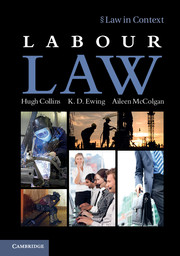Book contents
- Frontmatter
- Contents
- Preface
- Acknowledgments
- Table of cases
- Table of statutes
- Table of statutory instruments
- Table of European Union instruments
- Table of ILO instruments
- Table of other international instruments
- Abbreviations
- Part I Introduction
- Part II The contract of employment
- Part III Statutory regulation of the employment relationship
- 7 Wages
- 8 Working time
- 9 Equality
- 10 Work/life balance
- 11 Civil liberties at work
- Part IV Collective labour rights
- Part V Termination of employment
- Index
- References
9 - Equality
from Part III - Statutory regulation of the employment relationship
- Frontmatter
- Contents
- Preface
- Acknowledgments
- Table of cases
- Table of statutes
- Table of statutory instruments
- Table of European Union instruments
- Table of ILO instruments
- Table of other international instruments
- Abbreviations
- Part I Introduction
- Part II The contract of employment
- Part III Statutory regulation of the employment relationship
- 7 Wages
- 8 Working time
- 9 Equality
- 10 Work/life balance
- 11 Civil liberties at work
- Part IV Collective labour rights
- Part V Termination of employment
- Index
- References
Summary
Introduction
This chapter is concerned with British anti-discrimination law, namely, the Equality Act 2010 (EqA 2010), which with its implementation in October 2010 and April 2011 replaced its many predecessor provisions governing discrimination. Insofar as they applied in the employment context, those provisions consisted most importantly (and in chronological order) of the Equal Pay Act 1970, the Sex Discrimination Act 1975 (SDA 1975), Race Relations Act 1976 (RRA 1976), the Disability Discrimination Act 1995 (DDA 1995), the Employment Equality (Sexual Orientation) Regulations 2003, the Employment Equality (Religion or Belief) Regulations 2003 and the Employment Equality (Age) Regulations 2006. The only major discrimination legislation which survives the implementation of the EqA 2010 is the Equality Act 2006 insofar as it establishes the Equality and Human Rights Commission.
The EqA 2010 had a lengthy gestation and an uncertain birth. The Discrimination Law and Equalities Reviews were announced in 2005 and reported in mid-2007, the former with the publication of a consultation paper, A Framework for Fairness: Proposals for a Single Equality Bill for Great Britain. A Framework for Fairness, which proposed a consolidation of discrimination law together with an assortment of specific adjustments to the existing law, was criticised for its lack of ambition by trade unions, the equality commissions and NGOs. This criticism appeared to fall on closed ears, the 600-page Equality Bill 2009 proposing relatively little in the way of substantive change to equality/discrimination law but some potential hostages to fortune, among them the proposed extension of the equality duties to religion/belief.
- Type
- Chapter
- Information
- Labour Law , pp. 311 - 369Publisher: Cambridge University PressPrint publication year: 2012



